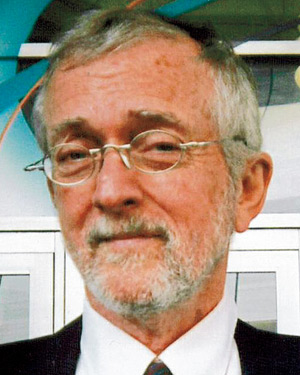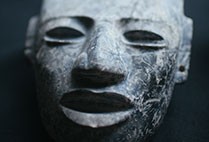Peter Diamandopoulos, 86
College of Arts & Sciences professor emeritus of philosophy, on April 1, 2015.
Born in Heraklion, Crete, in 1928, Diamandopoulos attended Athens College. He immigrated to the United States in 1948 to attend Harvard University, where he earned a BA, an MA, and a PhD.
A lifelong educator, he taught at the University of Maryland and at Brandeis University, where he was dean of faculty from 1965 to 1971 and chair of the philosophy department from 1972 to 1976. He was also director of studies at the Adlai Stevenson Institute of International Affairs from 1969 to 1974.
Diamandopoulos was named president of Sonoma State University in 1977 and president of Adelphi University in 1985. Following his tenure at Adelphi, he was special assistant to the president and a professor of philosophy at Boston University. He retired in 2008. A proud son of Greece, he was known for his love of books, music, fine cigars, and cognac. He continued to support his alma mater as a trustee of Athens College.
Michael Martin, 83
College of Arts & Sciences professor emeritus of philosophy, on May 27, 2015.
Martin’s former colleagues and students say the ex-marine’s rough exterior belied a gentle personality. “Although he could be as tough as the former marine he was when it came to argument, he had a genuine Midwestern friendliness and a wonderful dry sense of humor,” says Allen Speight, a CAS associate professor and chair of philosophy.
Martin grew up in Cincinnati, Ohio, and joined the Marine Corps at 17. He earned a bachelor’s in business from Arizona State University, a master’s in philosophy from the University of Arizona, and a PhD in philosophy from Harvard University.
In 1965, he joined BU’s philosophy department, where he taught for more than 30 years. An analytic philosopher, Martin wrote numerous books on the philosophies of religion, social science, and law; in many of his works, he examined atheism, a subject he was passionate about.
It was one of those books, Atheism: A Philosophical Justification (Temple University Press, 1990), that inspired Tyler Wunder (GRS’06) to come to BU from Canada to study with Martin. “I was never disappointed with my choice,” says Wunder. “Mike was superb. He was brilliant, knowledgeable, and generous with his time. He stayed on as my advisor even into his retirement.” Wunder says Martin and his wife, Jane, a professor emerita of philosophy at the University of Massachusetts Boston, welcomed him to their home, even putting him up for the night when he had to defend his dissertation.
Lee McIntyre, now a research fellow at BU’s Center for Philosophy & History of Science, credits Martin’s generosity and mentorship with jump-starting his career. McIntyre had nearly completed a PhD in philosophy at the University of Michigan when he moved to Boston. Looking for mentorship as he was finishing his dissertation, he contacted eminent scholars in the area, and Martin invited him to his office. “Out of that initial meeting,” says McIntyre, “my career was born.”
During their conversation, they agreed on the need for a new text on the philosophy of social science, and “within an hour, we had an outline for one on the chalkboard next to his desk,” McIntyre says. This outline became the book Readings in the Philosophy of Social Science (MIT Press, 1994).
“If not for Mike,” he says, “I’m not sure I would have made it as a philosopher. Who else would greet a stranger so warmly and generously, then begin a collaboration and friendship that lasted more than 25 years?”
After his retirement in 1996, Martin published several philosophy texts, including The Myth of an Afterlife: The Case Against Life after Death (Rowman & Littlefield, 2015), which he coauthored with philosopher Keith Augustine.
He had other interests as well, including playwriting, drawing, and painting. He graduated from a 40-week program at Improv Boston and helped found New Tricks, an improv troupe whose members are over the age of 50. “Mike had one of the most remarkable emeritus careers of any academic I’ve ever known,” Speight says.
“Mike didn’t believe in the hereafter,” says McIntyre, “but he will sure live on in me and all of the others whose lives he touched.”—Mara Sassoon

Robert Ryan
Robert Ryan, 80
College of Arts & Sciences professor emeritus of English, on April 15, 2015.
Born in Sturgis, Mich., Ryan earned an undergraduate degree in English from Western Michigan University, an MA from the University of Connecticut, and a PhD from Northwestern University. Before joining BU, he taught at Defiance College.
Ryan was a Melville scholar who taught English for 40 years, 30 of them at Boston University.
He also was a voracious reader and writer who instilled in his family, friends, and students a love of ideas and an enthusiasm for sports and music. Few of the books he collected were spared his detailed comments in the margins, and conversations with him could be exhilarating or exhausting—but never dull.
“He had a dry, ironic sense of humor,” says Charles Rzepka, a CAS professor of English. “I met Bob when I first arrived at BU as an assistant professor of English in 1979, and he always struck me as bristling with energy and ideas. In 1983, when I started recruiting BU faculty for a Boston public schools curriculum development project funded by the National Endowment for the Humanities, Bob was one of a handful of senior colleagues to step up and contribute his time and considerable wisdom. He was never content with half measures. He didn’t just march to a different drummer—he was that drummer.”
An author of fiction and nonfiction, he coedited Published Poems: The Writings of Herman Melville, Volume 11, in 2009.
He believed physical activity fuels the life of the mind and often rode his three-speed bicycle along the Charles River to classes, with books bouncing in the front basket. He was a fixture on the tennis courts, sweeping away puddles to play in the spring and shoveling snow to play in the winter. Neighborhood kids would borrow his spare rackets and became his tennis pupils. He attended two Wimbledon tournaments and several US Opens.
Joseph A. Vita, 58
School of Medicine professor of medicine, on November 2, 2014.
The son of a pediatrician and a nurse, Vita graduated summa cum laude with a BA in chemistry from Yale University and earned an MD at the Columbia University College of Physicians and Surgeons. In 1986, he moved to Boston for a cardiology fellowship at Brigham & Women’s Hospital, where he met his wife, Gina, and went on to teach at Harvard Medical School for five years.
Vita joined the BU School of Medicine in 1994, and as a professor of medicine, during the next 20 years received numerous awards and honors, including the department of medicine’s inaugural Robert Dawson Evans Research Mentoring Award in 2007. He was the research mentor for more than 40 fellows in MED’s Whitaker Cardiovascular Institute training program. In 2010, the department of medicine again recognized Vita, this time with the Evans Scholar Award, an honor reserved for a senior faculty member who displayed equally remarkable strides in discovery and service to mentees.
During his time at BU, Vita gained international recognition for his research on endothelial function and antioxidants in atherogenesis, the development of fatty deposits in arteries, and in disease states.
He continued to practice at area hospitals, most recently as the associate chief for academic affairs in the section of cardiovascular medicine at Boston Medical Center, where he also practiced inpatient and consultative cardiology.
He contributed to numerous peer-reviewed publications and was the deputy editor of the journal Circulation and editor in chief of the Journal of the American Heart Association, an open-access publication he helped establish.—MS














































Related Stories
BUCH Fellowships Awarded to Nine Faculty
This year’s Fellows savor the opportunity to finish their books
2018–2019 Career Development Awards Honor Eight Junior Faculty
Funding for research ranging from driverless car safety to Buddhist religious history
Five BU Medical Campus Faculty Honored by Peers
Elected fellows by the American Association for the Advancement of Science
Post Your Comment